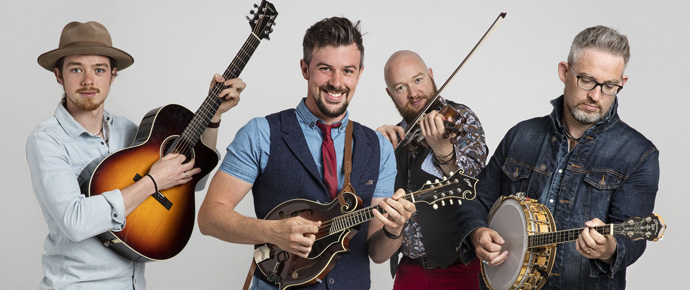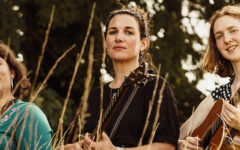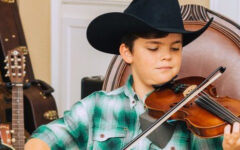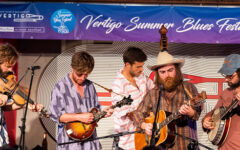
Welcome to a brand new column, Bluegrass Beyond Borders, a twice-monthly feature that explores music made beyond our shores by artists that hold a particular penchant for Americana.
In a way, there’s a certain amount of irony implied in that premise. It’s an established fact that bluegrass music was rooted in the traditional trappings of the British Isles and carried to these shores by immigrants that settled in Appalachia bringing their guitars, fiddles, mandolins, and banjos to their new home. And yet, over the course of the last century, what many have considered an inherently American form has spread across the world, a sound that’s now considered practically universal and enjoyed from the Far East to the Middle East, in Europe and all points in between.
Consequently, it’s appropriate that our first column begin with a look at an Irish band called We Banjo 3, a group whose love for bluegrass can be traced directly to the lineage established between their Celtic roots and the seeds planted in the U.S.A.
“The ties between Irish music and bluegrass are undeniable,” the band’s David Howlett agrees. “Even some of the tunes we learned as kids as Irish tunes, we ended up learning later on in the bluegrass sphere. We loved the technical brilliance and subtle detail in bluegrass. Seeing players improvise and develop the music without harming its natural origins inspired us. We’re all Irish players by nature, but we knew we could learn a lot from bluegrass.”
Hailing from Galway, We Banjo 3 primarily consists of two sets of brothers — David (lead vocals, guitar) and Martin Howley (tenor banjo, mandolin, vocals) and Enda Scahill (tenor banjo, vocals) and Fergal Scahill (fiddle, viola, dobro, percussion, guitar, mandolin, vocals) — who were drawn to one another through their common musical interests. To date, the band has released four critically acclaimed albums — Roots of the Banjo Tree, Gather the Good, Live in Galway and their latest, String Theory, each a showcase for their instrumental acumen and the ability to veer from traditional tunes to contemporary compositions. It’s a style that they’ve dubbed “Celtgrass” and its earned them a host of critical kudos, as well as top rankings on the Billboard World Music charts and the honor of performing for an American president, an Irish prime minister and members of Congress at the annual Friends of Ireland luncheon on Capitol Hill.
It could be argued that the band’s strengths derive from the sum of its parts. Martin Howley is a seven time all Ireland banjo champion who holds the distinction of being the first Irish musician to perform at the Grand Ole Opry. Enda Scahill is considered a world renown authority on Irish banjo technique, with credits that include work with Ricky Skaggs and the Chieftains, among many others. The other two members have been specifically cited for their skills as well.
For all the praise that’s been lauded on them, it’s the response given by their audiences that have affected them the most. “We’ve been blown away by the support we’ve felt in America,” David says. “Time and time again, we’re shocked at the level of generosity and kindness. The journey of We Banjo 3 started with a goal that would allow a space for people to come and enjoy a night of music, fun and community, a sort of shelter in a modern world. Seven years later, we’ve been all across the country, played to so many lovely people and had a ball doing it! We’re more excited than ever for this upcoming year which will see us playing to bigger audiences than ever in some amazing venues around some of our favourite bands.”
While it’s also evident that the band has been welcomed into Americana musical circles, they insist that they never intend to abandon their core musical identity. “We never wanted to be Irish guys trying to play bluegrass,” David insists. “Rather we took the inspiration from bluegrass and teamed it with our own heritage to create something entirely new, which has now been dubbed as “Celtgrass.” Nashville is home to some of our favourite artists, as well as some of out closest friends in the music scene. The further cross pollination happens in someone’s living room at 11:00 p.m. after dinner and a drink, when we all decide to pull out a instrument for a tune or two. That organic meeting of cultures is what feeds the musical fermentation. We love being somewhere where we can feel like both students and community members.”
The band is currently working on a new album which they’ve funded through a PledgeMusic campaign, which they’ve spiced up by offering extra incentives, including offering fans time they can spend with the individual band members, and a chance to appear in a music video for one of the new songs. Through it all, We Banjo 3‘s mantra remains the same — that is, to further reinforce the bonds between the indigenous music shared both at home and abroad.
“Folk music crosses all borders and cultures,” David says in summation. “The cross pollination of Irish, Scottish and American music has been fundamental for advancement. They all reflect the world in which they are written into. The lilt, swing and drive can be interpreted in many different ways, and because of that, it lends itself to being quite universal. All three are felt more in the heart than the ears.”







